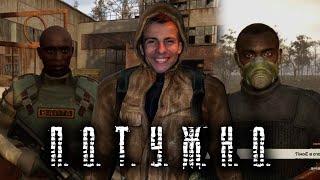
The Power of Choice: Blank Slate or Predefined Character?
https://www.youtube.com/channel/UCmQy_HWuQC5MB2AXgkWr-dw/join
If you prefer Patreon: https://patreon.com/MarkDarrah
How defined should your protagonist be? A blank slate? Completely defined? There are advantages and disadvantage to leaving everything up to the player.
The video and audio is desyncing in the video and I have no idea why...
Did we make a merch store?
Yup: https://old-game-dev-advice.creator-spring.com/
Chapters:
0:00 Tabula Rasa or Predefined
0:25 Tabula Rasa
2:36 Minimal Definition (BG3 and Skyrim)
4:29 Origins and Backgrounds (DAO)
5:28 Old School D&D
7:21 Archetypes (Mass Effect)
8:26 Defined Character (DA2 and Witcher)
9:35 Fully Defined and Static (Uncharted)
10:43 I am ME (Tetris)
13:10 Who am I? (StarCraft)
15:17 It's 2 Dimensional
18:06 The Best One!
21:35 AI?
Social Media:
Follow me on Twitter: https://twitter.com/biomarkdarrah/
Тэги:
#GameDev #Advice #Mark_Darrah #Dragon_Age #BioWare #Videogames #Baldur's_Gate #game_development #game_dev #Ask_Gamedev #Game_Development_For_Beginners #Anthem #Sonic_the_Hedgehog #Video_Games #video_game_industry #game_developer #gamedevКомментарии:

The sync seems slightly better, but I might be mistaken. Still out of whack, though, ever so slightly. :(
Ответить
A very interessting theme. This show a bit the decition dev. have to make.
Ответить
Yes, i would be interested in a tabula rasa what's more dynamic using some kind of artificial storytelling machine --- a text based adventure could be the perfect place to go, especially if it allows for mundane lifestyle character drama as well as all the annoying bank heists and hero hijinks that D&D tends to devolve into.
imagine in the game there's a computer room and you play as a defined character who is interacting with the machine storyteller through a keyboard, maybe there are colleagues there through whom a more structured narrative can be told.

cool video! I'd actually been thinking about this a lot lately as I'm curious how far into a game you could push set characterization. like at the beginning you choose a simple blurb backstory then get to retroactively fill it out more through tracked dialogue options that have consequences as the game progresses. that'd require a ton of extra writing tho and there's always a chance that more rp focused players would have initially thought up a character that your system doesn't allow for anyway.
be that as it may, i have no interest in any story that's written or expanded through machine generated content. even putting the ethics aside, id much rather have a more limited but meaningful expression of who i imagine my character to be than to infinitely generate particulars that will never mean anything.

Sorry, Mr. Darra, but I don't believe that a pure blank slate or completely defined main character exists, especially in video games. No matter how open your world is, you still have limitations due to mechanics or legal issues. As a mage, you can't invent a new spell, unless it has a spell constructor. As an intelligent character, you can't make some elaborate trap in something like ADOM or even Dwarf Fortress. You can only do there what is allowed by the game's mechanics. Maybe as DM in table-top, you can be more flexible and implement something that your players describe, but even in that case you will probably not allow some things (I'm sure you will know better which ones).
Same with, the "defined" end of the spectrum. Even in books and movies that don't allow any interactivity whatsoever, there is often some room for interpretation of a character's actions, and different people would see different thought processes in a character's head for each decision. And in the game like BioShock Infinite or StarCraft, a player while not having choices in the dialog can make a lot of choices in the game that would define his character like, for example, a cautious type or someone who bashes through walls, or methodical, etc.

yeah as much as I love Bioware because of blanker protagonists, fans often have a blindspot for butterfly effect, they do not understand that mostly because of blank CC DA is exponentially more ambitious than ME, ME is absurdly more challenging than Witcher, Skyrim cannot be compared at all. It is not surprising considering that D. Gaider even mentioned how many good writers cannot do even basic branching dialogues. Wrapping your head around branching storytelling seems to be a rare brain wiring, like real time translating live speech. Most fans do not seem to understand, that DAO is the worst approach and ME1 is the best approach if you want both player choices and consistency across multiple games in the long run. Also the hatewagon about no blood mage OC in Veilguard (that being said I am still bitter about BM hating Hawke and lack of BM companion in DAV lol).
Ответить
Really enjoy your videos.
Ответить
This was a good one. I enjoyed listening to you go over the entire spectrum.
For my personal preferences, I like games all over the spectrum. Whether or not the game is good isn’t dependent on player freedom but on how successful the game is at fulfilling its own ambitions. If it’s a walking simulator, I want to enjoy the environment I’m walking around in. If the focus is on the story, I’m fine with giving up some autonomy for a good story. Same the other way around.
Getting conflicting messages within the game bugs me. For example, in Mass Effect we are allocated certain freedoms but because someone thought Shep should be horny in MEII I’m forced to navigate flirtatious dialogue with Jacob. Flirting with everyone else is an active choice but a default setting with this one character. It’s like they’re saying “I know we gave you choices, but you’re supposed to pick this one here.”

Its the difference between Gordon Freeman and..Mario
Ответить
What do you mean you aren't wearing that hat.
Ответить
Thank you so much for the video. It's great to see the insight from a developer who worked on these types of games.
I would argue that Bioware games have always been better when they defined the protagonist a bit more. As you said, it give the developers more opportunities to use the characters in the storytelling. Which Bioware is really good an known for.
I think if every Bioware protagonist was voiced not much would change. As they are already pretty defined. I don't think DAO would change a lot if the Warden was voiced.

There is a feeling about story centered games or games, where story is as much important as gameplay. That the more defined character player and the game itself get, the higher quality it should be in order to like the game. Because if I dont have freedom (or have a little), then show me what YOU (developer) can do with YOUR freedom.
But then we have players that want to have a piece of themselves in a character to relate to them on one hand. And industry that wants money first and foremost, and (partly as consequence) larger playerbase.
Which i think leads to why modern games (AAAAAA specifically) tend to give less choice for a player. To make it easier for them to develop. But at the same time to give players at least a bit of choice, so that players would see a piece of them in the game and more likely like the game and at the same time to have less responsibility for the character and story.
And this, i think, may lead to the pint where there too many games that are not complex enough in story and\or world building, and at the same time dont give much freedom to a player, but they sell very good so industry is fine. Which is not actually bad, but concerns me in terms of creativity of the game industry.
What do you think?

I wonder if the almost blank slate protagonist will be voiced in the near future thanks to AI. I'm expecting something along the lines of main story and important quests voiced by VA, unimportant side quests and rarely occurring dialogue by AI.
Just recently the strike from VA's just started, and one of their main concerns is AI.

Incredibly interesting to see the thought process on approaching such a decision. But, to be really honest, you had me at "tabula rasa." Latin rocks. :-) Quick edit to add: I much prefer less reactivity with better story telling vs more reactivity and sub-par AI storytelling.
Ответить
What came first, the idea of us being ourselves inside a game, or playing a game so good we wish we could be in that world ?
Tip: we did not know games existed before we played them.
At some point, someone, somewhere created an experience that we enjoyed so much, we wish we could do more inside that world, and now we want to bastardise that work by assuming that it was US who made the game fun, we DEMAND that developers find a way to let us be ourselves inside their worlds, we forget that it was them who made us have fun, not ourselves, we had 0 creative agency in tentertaining ourselves through videogames, so no, I disagree with people that want to be themselves inside a game beyond a character creator, they're children and children don't make smart choises, they have whims.

Great video, very informative! I'm firmly in the defined character camp. Me and my wife really loved DA2 despite its shortcomings precisely because we loved the story and the characters. Who cares that there is only one dungeon when the characters are so fun to talk to, haha.
Gamefying AI is a very interesting topic, because right now everyone is still on a very big and very justified hate train of everything AI, so very few real attempts are being made. At the same time, minimal definition games have become harder and harder to produce over the years, so maybe in 5-10 years or so, when the technology is more mature and people are potentially more accepting, even a solo dev might pull it off, which is an interesting prospect! Will people like infinite variety of same-ish, but sort of unique story content curated by solid game systems? I'm willing to bet on yes, because a lot of live service games aren't exactly literature anyway. Will it be a gem remembered for decades to come? Not exactly, but that's not what people are looking for in their day to day entertainment anyway.

To extend on that i would reframe the problem a bit: players, in interactive story telling and writing, have an issue of exposition. Character need an introduction to function in a narrative, which slot them in narrative role within the ongoing arcs of the story. The spectrum of tabula rasa to defined, is one way to adress that.
Tabula rasa are difficult because there need mechanics to introduce the player, as a character into the story world, to the narrative. Stat sheet, moral choices, factions, affinities, flags, are way to handle exposing a blank state character to the narrative, like we have need to expose the world and character to the player.
But *typically* these mechanics are seen from a simulationist perspective, ie branching consequences to actions, which frustrate a lot the narrative, since the branching factor dilutes the intentionality.
This lead to bad narrative pattern like on the spot dilemma, which stop all progression until the player make a choice about a problem he just encountered. Mass effect soften this considerably, by having the dilemma asked at the beginning of a quest, that walkthrough the pro and cons of the **subjects**, and let the player answer at the end, once he got all of the exposition.
Reframing this problem as exposition allows to bridge the gap between narrative and simulation, as it imply the aesthetics of exposing the player to the world is *the quizz* ie that each narrative situation isn't just branching, it's directly questioning the player who he is through metaphorical subjects and topics, then we regularly tally the response to give back the world answers back to the player. Ie it becomes player character driven.
But that's not enough, we need to unify plot and character to control the branching factor. Character and plot driven narrative has been an old debates, but I posit that stakes is the true foundation, stakes define what actions and plot is relevant, and it pressure character to take action. When the character is undefined or random, stakes still keep the arc compelling by keeping meaning of story coherent.
What is stakes mechanically? Well it's simply progression toward failure and success. If you are poisoned, you need to seek for the cure or die, how you or character handle this situation is meaningful.
And since it's a progression, we can tie events to the state of progress, to make the world react to your actions. Even uf you fool around, character might become increasingly concern, disillusioned or wax poetic about existence, because the current stakes define the narrative context.
Stakes as mechanic allow to better structure both tabula rasa and defined character in interactive narrative, by allowing to create plot point that are quizz tracking each characters in context were *any* action is given meaning by the subject of the current context. I have a bigger graph breakdown that deconstruct this. That's just an explanation of some of it's part lol😅
You can tell I'm unemployed by the time spent in that comment 😂

Imagines playing Neverwinter Nights 1 trilogy as a banana Nope, can't do it :D. I like Mass Effect best if I had to pick.
Ответить
I really like the analogy of the vectors! I would take it one step forward and say that the vectors are not orthogonal*. You can go in the direction of having a defined protagonist, but this will make it *harder to implement player agency on the story, and viceversa.
Ответить
Personally, I very much prefer the "new" D&D and DAO way of doing things. Every time I play D&D, I talk with the dungeon master and discuss the world and the possibilities for a vague idea I have for my character. And then I craft my character around the constraints of the world so that my character fits the world and has a lot of backstory-related things they can interact with during the campaign. I felt like DAO did this so well with the origin stories (which is why I've also been quite disappointed with the other DA games cause there were no playable backgrounds). I like to feel immersed and anchored in the game world when I play a roleplaying game, because otherwise if my character feels like too much of a blank slate I can't roleplay well enough. The "defined" zone also works well for me sometimes, depending on how strong the narrative of the game is. For example, Disco Elysium and Pentiment are games in which the character is predefined in many ways, while still offering you some options in how you want to portray that character. ME2 felt the best for me in terms of roleplaying out of the Mass Effect games, though I still felt it was somewhat lacking compared to things like Disco Elysium, or honestly even DA2.
I couldn't really play BG3 because "tabula rasa + you have a worm in your brain" didn't really make me feel like my character was part of the world. My character could've just as well been an alien from our solar system who got to Faerun on the mindflayer ship. It's interesting to note how many people seem to enjoy the more tabula rasa side of the spectrum, however. Skyrim and BG3 have been huge hits.

Great video! I can enjoy all types or protagonists, but I find that (with exceptions ofc) games that are more on the blank slate side have a tendency to disappoint me a little since I build up a character in my head only to then realise that the dialog options don't actually offer what I imagined my character to be
Ответить
Interesting never really thought of RPG characters I play as being on a spectrum of Predefined or Blank Slate. Got me in the mood to play some old crpgs. Might play Neverwinter Nights or Baldur's Gate.
Ответить
Can confirm, we can see the audio-video desync ;)
Ответить
I think my favourite spot on the spectrum is 'the game defcides the character's past, but the player decides the character's present (and possibly their future)'. This means that the PC has a defined backstory and starting place within the world, but the player has a lot of latitude to decide how they will act right now.
This includes the uses of amnesia that I actually like (i.e. Planescape Torment, Disco Elysium and, from what I've heard, KotOR 1, although I admit that I've never played it). In most games with amnesia, it's used as an excuse to have the character's backstory not matter at all, which I'm not a big fan of. However, in the games I mentioned, the character's past is extremely important to the story, and amnesia instead serves as a reason why the character might act differently now than they did in the past.

I disagree that the spectrum of rpgness is linked to the spectrum of tabula rasa, or character creation freedom.
Apart from borderline thought experiment, all rpg have constraints and limitations. You can't make a Dwarf from the mines of Moria in a Star Wars rpg. Your character can't be active potus Obama, or Taylor Swift. A dungeon to clear? I'll send a full battalion of marines. A place to check out? Let me make a single tweet, while asking my assistant to hire a team to fact check and collate the answers...
Even if a GM would start a campaign with a wheelbarrow loaded with a complete collection of all GURPS books, or HERO books or Rolemaster books, and would tell you "make the character you want", you are still limited by what the rules can simulate, and by power level. And even if your GM let you play as Taylor Swift or Palpatine level of power, how about as jeweled-on Thanos? Or Galactus? Or the actual Catholic God? There are always constraints, always.
And that's not new. Most commercial adventures (what D&D call modules) have pre-made character. A lot of us have seen at least once some friend, spouse or even another player play an existing character when the usual player has to leave for an emergency. It might have limitations, some players might not like it, but it has little to no consequences to what the game played is, to its nature.
Those constraints in creation have, imo, nothing to do with the "rpgness" of a game.
Now, constraints during play, especially constraints about your interpretation of your character, that's different. And videogames are inherently strongly limited there, because everything or close to it has to be coded, whereas tabletop rpg have a human GM to run the simulation in their head. And yes, when you as a developer start cutting down systems or narrative options "because it doesn't fit what the character would say/do/think", you are entering a spectrum that can change the nature of the game itself, and you are on the spectrum going from full freedom Kenshi to The Last of Us with no agency whatsoever.
I remember when Mass Effect was released the first time, a lot of veterans players of crpg had issues with the dialogue wheel ("don't need to read or think about it, it's placement coded for your 'convenience' ", "no meaningful lasting consequences for choices", "lack of reactivity to systems created situation instead of fully scripted so-called narrative one") and would say it's not, or less of a crpg than say a Ultima or Fallout or a Morrowind. Not because your character creation was limited, and you had pretty strong constraints as to what Shepard did previously (notice the "did", which is very different from "thought").

I didn't understand the connection between dialog quantity and play style until this.
I hope current and future developers find this series of vids. It's a college course on management in general and game development on a micro level. Thanks Mark.

I couldn’t agree more with your final thoughts. When I play Skyrim, I’m invested in the world, because it’s essentially just me in it even though I’m not a Dragonborn or anything. When I play Mass Effect, I’m invested in Commander Shepard. It’s super important to make the frameworks you offer the player (like in most BW games) easily relatable and relevant to the character. When I pick the War Hero background, that’s seeded into how Shepard should make choices and behave. They’re still my choices, but I’m having to “immersion-check” them against what’s believable for the character.
Ответить
As someone moving from DMing into game design, this video is invaluable.
Ответить
as much as i love some of predefined characters like aloy or arthur morgan, i will never enjoy them to quite the same extent as the characters i created myself. and as a writer i once thought that the more freedom i have the better, but actually no, having played skyrim and bg3 i felt like i had too much possibilities here and not enough points of friction between my character and the world - if i wanted to do whatever i want, i'd just write a story myself, i guess. da games, esp dao and dai really hit that sweet spot for me, between giving some ramification of who a dwarf or an elf, or a mage would be in this setting, but i can construct my own character who can disagree with the world, or try to conform to it, or benefit from it. of course it's not always ideal (like i don't like how in most dao origins we're basically locked into playing someone pretty young), but it's just constrains in time and resources, and it's the closest i have encountered so far. dav seem to go that same path with all the factions etc, and i'm glad for it.
as for ai stuff, i don't think i would enjoy it, both bcos of the quality, but also for the same reason i don't roleplay with other ppl or usually play new releases - i like to know the story and the ramification of the game i'm playing, i'm too autistic to have the game suddenly change under my feet at a 5th ot 10th gameplay. i like game reacting to my decisions, but in a way i can expect and replicate when i'm replaying as the same character again.

For me, I like narrative choice RPGs with a protagonist in that middle ground that has a more defined role, such as Inquisitor or Spectre, but still allows for a range of expression within that role. I find it far more engaging to actually roleplay. Whereas a very loose character such as in BG3 or Skyrim, I feel very untethered to the narrative. And it becomes very difficult for the game itself to create emotionally engaging story content since, at any point, the player can just decide to kill their party members or become evil on a dime. With a more defined role, even wild swings from a player to the opposite end of their usual moral alignment tend to make sense within the narrative since it must fit within their defined role. I can still be a Paragon and decide that letting the Council die is the right decision.
Even further defined protagonists such as Geralt in The Witcher series or V in Cyberpunk can be enjoyable. However, I do dislike the lack of freedom to truly express myself. Of course, there is that added benefit of the writers being able to create further emotionally engaging content. For me, that middle ground hits perfectly.

I prefer good story telling. I feel like I have better things to do than to randomly walk around in a game universe. That's why I cannot stand open world games. Now I loved what was done in Hinterlands of Dragon Age Inquisition because there was an interesting story that could be found in various areas. But I do not feel the same when it comes to other open world games. Using AI to help with Laziness in story telling does not make me excited. I am not going to go on a rant about it...especially so near to me having to watch the Olympics where a Microsoft commercial was essentially encouraging students to have AI do their homework for them.
Ответить
I'd highlight a few examples of Tabula Rasa on an extreme end. And that's the likes of XCOM and Wizardry.
On an "old school" end, is the Wizardry scale of character creation. And that's a mix of "make a party of characters" (or names) to send an army or party with. But with not much detail to impart/remember, which leads to more immersion to a 'Tabula Rasa' scale.
On the other end of Tabula Rasa, is customisation when we get to the new XCOM Games. To a point, it can allow you to customise/adjust a character's appearance, and even class. But the thing with 'high end' Tabula Rasa games, is it often comes at the expense of a 'main' character's importance, to the plot. With their only influence is being there for the combat or scenes. And as a generic force/soldier within that scene or event.

Between the point of Hawk/Geralt and a non RPG like Uncharted, and that's the classic JRPG style where the character is defined and you don't have much choice beyond mechanical customizations and side quests.
Ответить
could you make a video about quest design and narrative documentation in rpgs?
Ответить
Editing the last one; that boy Jeff Grubb saying yall aiming for late Oct for release if he right this roadmap need to be hitting the ground running on monday especially since yall skipping gamescom
Ответить
Definitely would not like to play a game where the content is AI generated. As far as what type of these I prefer, honestly something like ME or DA where my protagonist has some limitations placed on him work pretty well. I like how in those games, characters will react to my background choices, which is something I feel TES lacks a lot when I play an Elf in Dragon Age it feels like that matters in the context of who my character is and how that shapes his interactions in that world. When I do it on Skyrim or even previous TES games like Morrowind or Oblivion I don't feel it matters much if I play as an Elf or one of the beast races or even as a human.
Ответить
I do enjoy your videos! I'd just like to ask whether (if you can answer) there will be tavern songs in Veilguard? I loved them in Inquisition and still get them stuck in my head today! 🙂
Ответить
Variety is the spice of life. I want all the games in all the styles. I want all the shades in between; a dev has to devote years of their life to a single game, but even the really long ones only take me a few months to play.
But listening to this reminded me of one of the more... I'm not sure what the word is, visceral? Visceral gaming experiences I had this year, which was in FFVII: Rebirth. At one point the game forces the player, as Cloud, to attack Aerith. If you don't do anything, the game stalls. It won't progress at all. If you want the game to continue, you have to move the thumbstick and hit the attack button. It made me so mad. Cloud makes so many bad decisions and so many unforced errors and making that scene interactive forces the player to be complicit.
FFVII is a pretty on-rails game, so I'm sure someone was intending to make me feel angry and defeated, and they succeeded, so all according to plan. But one risk of a defined character is that they're making choices & the player can't go along. All interesting choices risk that effect, because interesting choices are by definition divisive. But then boring choices are boring, and make for boring games.

Now I am just imaging the Dragon age style mood options for Geralt. I think I would settle on Grumpy, Angsty, Apathetic, and horny.
As far as interesting games where you are the character Stanley parable is almost certainly the peak of what's out at the moment. though you could quibble that its Stanley the game never acts like he is the one doing anything.
Banana's and Balrogs is now a TTRPG I am very tempted to write.
As far as A.I. goes I doubt I would want to seen one that can change up a game too much any time soon, but I would be very interested in one that can add a little more acknowledgment of player choice to a game with an more traditionally written story. So instead of a game halving like 3 lines of dialogue in the whole thing calling out that you are a mage and not a warrior, it can have it come up a bit more often and possibly even talk about things like what you favorite spell is, or how much of a let down it was that villain that talked a big game just got shoved in a pit in 3 seconds and died.
edited after I realized I had a lot more thoughts on the video.

I always consider the character I play as my avatar in the said game universe, in part the character is me, but I must play along with whatever it is in that universe. I must consider the morality, the sentiment, and everything else in that universe which is not the same with reality. Meaning although the character is me, I can't be me as in reality but in the said universe setup. So, the game must give me understanding on how the world works and how things reflect my character.
For example, my character is a magician, I must know how everything about magic and being a magician in that world, because I am not a magician and there is no magic in real life, I can't simply be myself in that world. So, when there are issues regarding magic, I must make decisions based on the lore of that world and my character bias, not my own sentiment in the real world. Things like is blood magic evil. is dark magic evil, Is all magic evil? The word is blood, dark and magic but don't have the same meaning in the real world. it sounds bad, but really? So, I must know what my character in that world would think about it, not my own.
By far most games are actually using real world morality and sentiment because it is hard to completely creating new morality and sentiment in a fantasy world. So, our own bias does get into the game through our character, for me it is underwhelming. Racism is bad, magic is evil, religion is good, helping people is good...ect. Only KoTOR 2 does twisting it around a bit, and I like that. It makes me think as my character, not as myself 😁

I actually quite liked Mass Effect's version of Shephard. Largely blank slate but key events were defined (if given a choice), allowing for customized content within the game, whether unique spins to quests, conversations or even customized quests in general. Another example is in Dragon Age 2... or 3? where if you sided with (or against) the Werewolves in an earlier game you would get a unique spin on a particular quest.
I think we might see slightly more Tabula Rasa type characters as game developers leverage Large Language Models and use Generative AI approaches (ethics aside), I don't think they would be 'perfect' Tabula Rasa's though. Obviously trade offs with speed and I still think many aspects of the character will be defined (character is a spy, or a vampire, or somehow uniquely qualified to perform the story at least)

Baldur's Gate 3 gives you the possibility to come up with whatever story you wish for your character, and still, ironically, I much more prefer playing as a Dark Urge character. It makes for a much more compelling story while still giving me the possibility to role-play the type of character I want to be. Sometime is more compelling filling an half filled slate then a fully blank one, to choose what type of character you want to be in spite of the context around you, not according to it.
Ответить
I vastly prefer as much of a blank slate character as is possible in the game being played. In tabletop it is implied your character fits in the world and players may need to consult with the GM prior to starting the game.
In a a videogame this gets narrowed in even more because of general game constraints and this is fine. Compromise has to be made.
Overall I prefer as little backstory for my own character as is possible to make the game fun.
This in no way means I can't have fun with a more predetermined character.

Am i weird If there is only one look for a character used in marketing of a game example Female/Male V in Cyberpunk even if the game has character creator, i can't create a character and choose to play as the one used in marketing otherwise the playtrough does not feel canon 😂
Ответить

























